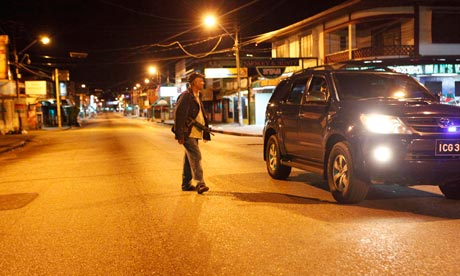By Alexandra Halsey-Storch
Impunity Watch Reporter, Europe

THE HAGUE, Netherlands–On Thursday, notorious genocide suspect and former commander of the Serbian Army, Ratko Mladic appeared at the United Nations International Criminal Tribunal of Yugoslavia (ICTY) for a pre-trial hearing at The Hague. He wore a gray suit, crème colored shirt and “sober black tie.” Lead defense attorney Branko Lukic, to whom Mladic left most of the talking, accompanied him.
At his arraignment in July, Mladic was thrown out of court after shouting at the judges. Pursuant to international law, A plea of not guilty was entered on his behalf by the presiding judges.
On May 26, after 16 years of hiding, Mladic—one of the United Nation’s most wanted fugitives—was found north of Belgrade in the small farming town of Lazarevo. Officials arrested him after receiving a tip. He was thereafter indicted on 11 counts of genocide, war crimes and crimes against humanity that were committed during the 1992-1995 Bosnian war. He has been incarcerated at The Hague prison. Should he be found guilty, Mladic faces life in prison.
At the hearing, presiding Judge Alphons Orie explained that the purpose of the hearing was to set deadlines for pre-trial procedures. He expressed concern over the inevitably long length of the trial and Mladic’s purported bad health, and asked when prosecutors would be ready to turn over evidence to the defense that could demonstrate Mladic’s innocence.
While the pre-trial hearing on Thursday was largely procedural, at controversy was Mladic’s health and its potential effect on the trial; however, due to privacy rules, the conversation was conducted without the media being present, in a closed session.
What is known is that the defense attorney argued that Mladic, whose poor health has been a persistent issue since his arrest, might be too ill to stand trial.
When Mladic appeared in court on May 27, his questioning was postponed to the following day as a result of illness. Furthermore, according to the defense, Mladic was committed last week to a hospital in The Hague for a hernia operation; however, the court claimed that to the contrary, Mladic had not left the detention center.
In response to Mladic’s poor health, the prosecution proposed in a motion that the trial be set up into two phases. First, the prosecution would try Mladic as the mastermind behind the worst genocide since World War II: the death of 8,000 Muslim men and boys in Srebrenica in July of 1995, who were “mowed down” with their “hands behind their backs” by the Serbian Army. The prosecution said that sufficient evidence for this atrocity could be collected within a year as ICTY had already collected relevant evidence from the preceding trials of Mladic’s subordinates and Radovan Karadzic.
The prosecution further proposed that once a decision had been entered for the first crime, Mladic would be tried in a following trial for the remaining crimes, foremost, the three and a half year siege of Sarajevo where 10,000 people died, including 1,500 children.
Lukic responded that this procedure would not be conducive to the defense’s argument; however, he has until August 31 to respond in greater detail to the motion before the judge makes a ruling.
The next pre-trial hearing is set for October 6.
For more information, please see:
The New York Times — Serbian Says Jailed Mladic Will Face War Crimes Trial — 27 May 2011
CNN.com — Mladic back in court after Croatia suspect pleads not guilty — 25 August 2011
Expatica.com — Court gives Mladic lawyers week to decide on split trial — 25 August 2011
Monsters and Critics — Mladic back in ICTY courtroom for procedural hearing — 25 August 2011
The Washington Post — Former Bosnian Serb military leader Ratko Mladic back in court for pretrial hearing — 25 August 2011
Radio Netherlands Worldwide — Mladic: 2 pre-trial plans? — 27 August 2011



